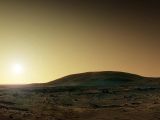NASA has asked doctors to come up with ways of helping astronauts heading for Mars get used to the long Martian day. They could be facing the same problems as a frequent traveler, as their internal clock could be messed up by longer daytime and different brightness.
The solar day (or sol) on Mars is only slightly longer than an Earth day: 24 hours, 39 minutes and 35.244 seconds and the Martian year is equal to 1.8809 Earth years, or 1 year, 320 days and 18.2 hours.
Dr. Charles Czeisler, chief of the Division of Sleep Medicine at Brigham and Women's Hospital and Harvard Medical School in Boston, US, has been experimenting on Earth, on patients with sleeping disorder and found that two 45-minute exposures to bright light in the evening could help people adjust to a longer, Martian-style day.
His experiments showed that people have a wide variation in the internal system that the body uses to keep track of days and nights, so the treatment can help them adjust to a new day length and light conditions. The bright light exposure sessions could help astronauts adjust to the conditions of space and of the Mars' surface and might also help people on Earth with certain disorders of this system.
"The results have powerful implications for the treatment of circadian rhythm sleep disorders, including shift work disorder and advanced sleep phase disorder," said Czeisler.
NASA is worried that the almost 25-hour day on Mars could throw most people into a state of jet lag, interfering with their abilities to learn, remember things, react quickly and sleep.
"In virtually all cases, the exposure that we get to light ... keeps us in sync with the 24-hour day," Czeisler said. So, if the astronauts gradually got used to a longer light exposure in a controlled environment, their internal clocks could be reset to run on the Martian hours.

 14 DAY TRIAL //
14 DAY TRIAL // 
